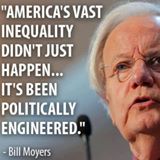Common Interest Health Care is the antithesis of the special interest sickness care system that plagues America.
Healthcare costs in the United States are pushing 17% of GNP versus about half that percentage in the capitalist democracies highlighted in the PBS documentary "Sick Around the World". The foremost economic issue is that health care is crowding out other vital sectors of the U.S. economy. In view of this, it is vital that any votes needed for the passage of health care reform be obtained with cost reduction measures rather than bipartisanship that preserves the profitability of health care special interest groups.
With all the new healthcare participants under any of the reform proposals put out, the trial lawyers will reap a huge windfall. Is this one of the unintended consequences of reform? If not, it should be addressed. Reform opponents would rally around tort reform that caps medical malpractice awards. Award-cap tort reform is a slippery slope that will likely spread to other areas, like employment, etc. If health care reform leaves medical malpractice unaddressed, once the anti-reformers regain the majority they will be gunning for tort reform.
One centrist's solution to the "more of the same" health care litigation or the award-cap tort reform is optional medical malpractice arbitration. Health care reform should mandate arbitration healthcare policies alongside the traditional right-to-sue policies. Dual option health care will enable the healthcare patient/participant the right to choose an arbitration policy option or the right-to-sue policy option. The arbitration policies should be priced at a meaningful discount to the right-to-sue policies. If health care insurers push-back on the arbitration policy proposal, the logical response should be: "the public option will be very comfortable offering both arbitration and right-to-sue policies at appropriate price differentials."
The arbitration concept has a meaningful track record at conflict resolution involving various types of insurance and non-insurance conflicts. A significant byproduct of the arbitration can be transparency regarding the factors contributing to medical malpractice, root-cause analysis and the resulting process improvement to bring down costs.
The Consumers Union Safe Patient Project, whose tagline is "End secrecy, save lives" provides testimony that process improvement in health care is sorely needed (visit: SafePatientProject.org) and the 2006 PBS documentary "Good News...How Hospitals Heal Themselves" provides testimony that health care process improvement is much more achievable than the special interest groups want us to realize. A trailer for this documentary is available at http://www.youtube.com/watch?v=_TA-oot-T-0.
(Note: You can view every article as one long page if you sign up as an Advocate Member, or higher).





